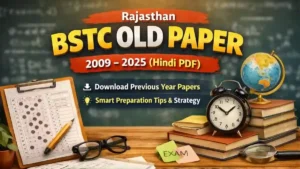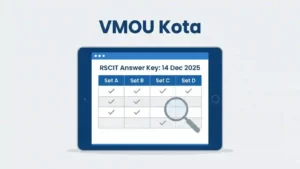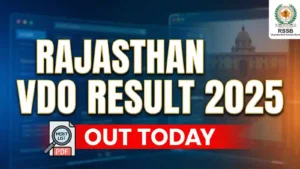Rajasthan PTI Previous Year Question Papers

Rajasthan PTI exam is conducted by the RSMSSB. This exam was conducted in 2011, 2013, 2018 and 2022. This article provide Rajasthan PTI Previous Year Question Papers.
Age
- Minimum Age – 18 years
- Maximum Age – 40 years
Educational Qualifications
- 12th class and Bachelor of Physical Education (B.P.Ed) or Certificate in Physical Education (C.P.Ed) or Diploma in Physical Education (D.P.Ed)
- Knowledge of working in Hindi written in Devanagari script and knowledge of Rajasthani culture
Rajasthan PTI Download Papers
Scheme of Examination
This examination includes two papers:
- Paper I
- Paper II
| Standards | Paper I | Paper II |
|---|---|---|
| Total Marks | 200 Marks | 260 Marks |
| MCQ | 100 Questions | 130 Questions |
| Duration | 2 Hours | 2 Hours |
| Marking | 2 Marks for each correct answer | 2 Marks for each correct answer |
| Negative | Yes | Yes |
Paper I
| Subjects | Marks |
|---|---|
| Geography, Culture, History and Knowledge of Rajasthan | 80 Marks |
| Current Affairs of Rajasthan | 20 Marks |
| General Knowledge of World and India | 60 Marks |
| Educational Psychology | 40 Marks |
| Total | 200 Marks |
Paper II
| Subjects | Marks |
|---|---|
| General Knowledge of Physical Education of secondary and senior secondary standards | 60 |
| General Knowledge of sports, Physical Education and its current affairs | 40 |
| Theories, Definitions and History of Physical Education | 20 |
| Education and Games Psychology | 20 |
| Methods, Supervision and Organizations of Physical Education | 20 |
| Theories of Training and Decisions | 20 |
| Science of Basic Physical Anatomy, its Functions and Health Education | 40 |
| Entertainment, Camp and Yoga | 40 |
Rajasthan PTI Syllabus Download
Rajasthan PTI Previous Year Question Papers
| Subject | Download Links |
|---|---|
| 2022 – Paper I | Download |
| 2022 – Paper II | Download |
| 2018 – Paper I – Grade III | Download |
| 2018 – Paper II – Grade III | Download |
| 2013 – Paper I | Download |
| 2013 – Paper II | Download |
| 2011 – Paper I | Download |
| 2011 – Paper II | Download |
| Download All Exam Papers | Download |
Rajasthan PTI Detailed Syllabus
Rajasthan PTI Paper I
Geographical, Historical, Cultural and General Knowledge of Rajasthan:- Location, extent, relief features, climate, drainage, vegetation, agriculture, livestock, dairy development, population distribution, growth, literacy, sex ratio, religious composition, industries, planning, budgetary trends, major tourist centres.
Ancient Culture & Civilisation of Rajasthan, Kalibangan, Ahar, Ganeshwar, Bairath.
History of Rajasthan from 8th to 18th Century
— Gurjar Pratihars
— Chauhans of Ajmer
— Relations with Delhi Sultanate
— Mewar, Ranthambore and Jalore.
— Rajasthan and Mughals – Sanga, Pratap, Mansingh of Amer, Chandrasen, Rai Singh of Bikaner, Raj singh of Mewar.
History of freedom struggle in Rajasthan
— Peasants and Tribal Movements.
— Prajamandal Movement.
Integration of Rajasthan
Role of women during Medieval and Modern period.
Society and Religion
— Lok Devata and Devian.
— Saints of Rajasthan.
— Architecture
— Temples, Forts and Palaces.
— Paintings
— Various Schools.
— Fairs and Festivals.
— Customs, Dresses and Ornaments.
— Folk Music and Dance.
— Language and Literature
Office of Governor; Role and Functions of Chief Minister and Cabinet; State Secretariat and Chief Secretary; Organisation and role of the Rajasthan Public Service Commission and State Human Rights Commission, Panchayati Raj in Rajasthan.
Current Affairs of Rajasthan :
Major current issues and happenings at state level related to socio-economic, political, games and sports aspects.
General Knowledge of World & India
Continents, Oceans and their characteristics, global wind system, environmental problems, global strategies, globalization and its impacts, population trend and distribution, India and U.N.O., Major trends in International policies with special reference to Globalization and Nuclear nonproliferation. Location and its advantages, Monsoonal system, drainage characteristics, changing patterns of agriculture and industries, national income-concept & trends, poverty, reduction schemes, Features of India’s foreign policy, Nehru’s contribution in its making. Major Landmarks in the Constitutional History of India with special reference to Government of India Acts of 1919 and 1935; Gandhi’s contribution to National Movement; Ambedkar and Constitution; Making; Salient features of Indian Constitution, Fundamental Rights, Duties and Directive Principles of State Policy; offices of the Indian President and Prime Minister; India’s federal system; Major Political Parties.
Educational Psychology
Educational Psychology – its meaning, scope and implications for teacher in classroom situations. Various psychologists and their contributions in education.
Learning – its meaning and types, different theories of learning and implications for a teacher, transfer of learning, factors affecting learning, constructivist learning.
Development of learner – Physical, emotional and social development, development of child as an individual- concept development.
Personality – meaning, theories and assessment, adjustment and its mechanism, maladjustment.
Intelligence and creativity – meaning, theories and measurement, role in learning, emotional intelligence- concept and practices, human cognition.
Motivation – meaning and role in the process of learning, achievement motivation.
Individual differences – meaning and sources, Education of children with special
needs – Gifted and talented students, slow learners, delinquency. Development and implications in education of – Self concept, attitudes, interest,habits, aptitude and social skills.
Rajasthan PTI Paper II
General Knowledge of Physical Education of secondary and senior secondary standards:
- Physical Education: Meaning, Aims, objectives, Scope, Need and Importance.
- Misconceptions about Physical Education.
- Biological Foundation: Heredity and Environment, Chronological, Anatomical, Physiological and Mental ages. Body types/Classification, Second wind, Oxygen-debt and kinesthetic sense.
- Psychological foundation: Learning, Personality, Instinct, Emotions, Motives and Motivation.
- Sociological Foundation: Traditions, Leadership, Group dynamics, Socialization and Social interaction.
- Philosophical Foundation: Idealism, Pragmatism, Naturalism and Realism.
- Physical Fitness: Warming up, limbering down, aerobic and anaerobic activities, calisthenics and Rhythmic exercises.
- Exercise programme for the development of the following parts of the body: Chest, Abdomen, Back, Neck, Arm, shoulder, Thigh and Calf.
- Physical and Health related fitness test.
- Games and Sports as cultural heritage.
- Kinesiology: History, aims, objectives and role in Physical Education and Sports.
- Law of Motion, Lever, Force, Center of Gravity, Equilibrium and their relationship with sports.
- Common Postural Deviations/deformities.
- Therapeutic Modalities in Rehabilitations.
- Sports Massage: History, Approach, Effect and Types of Massage Manipulations.
- Prevention and First Aid for Common Sports Injuries.
General Knowledge of sports, Physical Education and current’ affairs and history:
Games/Sports: Athletics, Basketball, Badminton, Chess, Cricket, Football, Gymnastic, Handball, Hockey, Judo, Kabaddi, Kho-Kho, Lawn Tennis, Swimming/Diving, Table Tennis, Volleyball and Wrestling.
- History of above Games/Sports
- Latest general rules of above Games / Sports.
- Measurement of play fields and specifications of sports equipment of above Game / Sports.
- Fundamental Skills of above Games / Sports.
- Related sports terminologies of above Games / Sports.
- Proper sports gear of above Games / Sports.
- Important tournaments and venues
- Sports Personalities
- Sports Awards
- Sports associations or federations.
Modern Olympic Games: I.0.C, Start of Olympics, Olympiad, Objectives, Motto, Olympic Charter, Olympic venue, Olympic Flag/Ring, Olympic Mascot, Olympic oath, Olympic Flame/torch, Medals, Opening and Closing ceremonies.
Theories, Definitions and History of Physical Education:
- Definitions and principles of Physical Education.
- Physical education in the city/states of Greece and other countries.
- Physical education in ancient India: Vedic period, Epic period and Medieval period.
- Survey of Modern Physical Education in India: Pre and post independence period.
- Contribution to the growth of physical education by leaders and movements of following:
- Leaders: B.P.De Coubertin, Johan Basedow, Guts Muths, H.C.Buck, G.D.Sondhi, Dr.P.M.Josheph, Prof.D.G.Wakharkar ,Prof.Karan Singh and Prof.Ajmer Singh. Movements: Turnverein Movement, Philanthropium movement, Spartakiad ,Y.M.C.A and Akharas.
Education and Games Psychology:
- Psychology: Meaning, Definitions, Nature, Branches and Scope.
- Importance of Psychology in Education with special reference to Physical Education.
- Growth and Development,
- Sports Psychology: Meaning, Definitions and Nature.
- Psycho-physical unity. GQ
- Individual differences.
- Transfer of training.
Methods, Supervision and Organizations of Physical Education:
- Types of teaching methods, principles of teaching, presentation technique, principles of class management.
- Lesson planning: types of lesson, objectives and parts of lessons.
- Teaching Aids.
- Guiding principles, essential features, techniques and qualities of supervision.
- Organization and conduct of competitions and tournaments: knock-out, league, combination and challenge or perennial type tournament.
- Public relation: meaning, importance in physical education and sports.
Theories of Training and Decisions:
- Sports training: Principles, Characteristics and methods.
- Training load and Periodization.
- Motor abilities: Meaning, Types, Principles and methods of developing.
- Coaching: Meaning, Techniques, tactics and Lead-up games activities.
- Officiating: Meaning, Importance and Principles.
- Qualities, qualifications & responsibilities of a good official.
Science of Basic Physical Anatomy, its Functions and Health Education:
- Anatomy: Meaning, concept, need and importance in physical education& sports.
- Cell, tissue, organ and organ system.
- Bones and Joints: Definition, Classification and Terminology of movement around joints.
- Muscles: Structure and Functional Classification, General Characteristics (Properties)
- Exercise Physiology: Meaning, need and importance in physical education & sports. Effects of exercise on muscular system, circulatory system and respiratory system.
- Health: Dimensions, Ecology, Spectrum, Determinants and Positive health, Hygiene, community health and aspects of school health services.
- Health education: concept, objectives, importance and principles.
- Food, nutrition, balance diet and diet according to sports activities.
- Health problems.
- Diseases: Communicable, non-communicable and hereditary.
Entertainment, Camp and Yoga:
- Recreation: Definition, Types, Scope, Significance, Philosophy and Objectives.
- Theories of play.
- Organization and administration: Agencies offering recreation, facilities, equipments and their maintenance.
- Types of recreational activities.
- Camping: Scope, significance and Types of camps, Selection and Layout of camp sites, Organization and administration of camps.
- Yoga: Meaning, Types, Stages, Scope, Objective, Significance and yogic kriyas.
- Pranayama.
- Asanas and its Advantage: Ardha matsyendrasana, Bhujangasana, Chakrasana, Dhanurasana, Halasana,
- Mayurasana, Paschimotanasana, Padmasana, Shalabhasana, Sarvangasana, Savasana, Sukhasana, Tadasana and Vajrasana.


